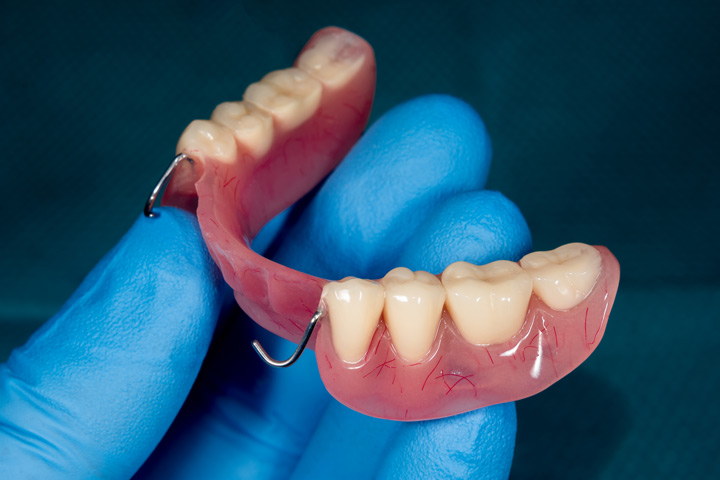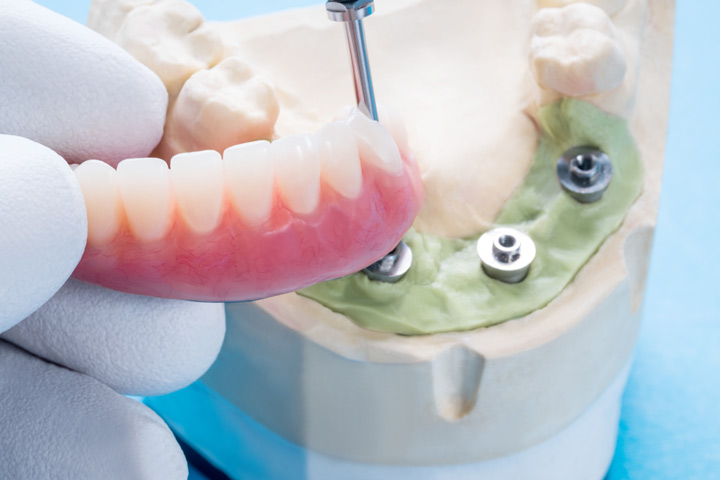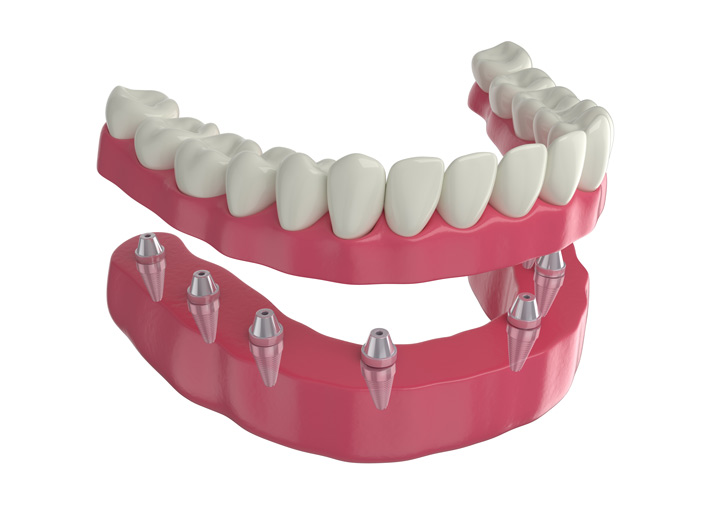While replacing missing teeth was difficult in the past, things have changed. Today, you can choose from a few options to address tooth loss, including partial dentures and implant supported dentures.
Dentures and implants serve the same purposes, such as helping people chew food or improve their speech and supporting their facial muscles. However, there are significant differences between both.
Each tooth replacement option has its own pros and cons, so it’s crucial to evaluate them to make the right choice. Plus, you should consider several factors when picking a solution.
Fortunately, this guide contains all the information you may need to choose between implant supported dentures and partial dentures. Read on!
What Are Partial Dentures?
Partial dentures are commonly known as “false teeth,” as they’re pieces designed to replace missing teeth in the upper or lower portion of the mouth.

More often than not, they’re removable. However, there are “fixed partial dentures” that patients can use as a semi-permanent solution to fill gaps of missing teeth.

Often worn when one or more natural teeth are still present, these dentures are made of acrylic resin, or porcelain and fixed with metal clasps or precision attachments. All types of dentures require regular maintenance or denture care.
Removable partial dentures must be removed when you go to sleep. This is essential to allow your gums and jaw to rest from wearing the artificial teeth. Additionally, it can help you maintain good oral health and avoid potential health complications.
If you wear “Fixed partial dentures“, you won’t need to remove them before going to bed. However, you should always clean them properly and take proper care of them, following expert recommendations.
The Procedure
Are you in need of partial dentures? Visit Shreve Denture Clinic in Leamington. With our in-house denture laboratory, we can make a mould to create a custom piece considering the colour, shape, and size of your jaw and remaining teeth.
A professional denturist will perform an initial fitting once the partial denture is fully designed. That means it’s necessary to check if the piece fits correctly and you feel comfortable using it.
You should also schedule followup appointments at our local denture clinic to address any issues that may arise or make necessary adjustments.
Pros and Cons of Partial Dentures
Whether you choose a fixed partial denture or the removable option, there will be advantages and disadvantages, including the following:
Pros
- Partial dentures are budget-friendly since they’re cheaper than complete dentures and implants.
- They’re ideal for people who aren’t eligible for dental bridges.
- Since they don’t require surgery, partial dentures are an excellent option for those who don’t want to undergo surgical procedures.
- Unlike traditional dentures, modern options are made of lightweight but durable materials, so they’re comfortable and will last longer.
- A partial denture can be just a replacement tooth. Therefore, most people find it easy to adapt to them.
- If you’re missing one or more teeth, partial dentures can give you more confidence by filling those gaps and making them invisible when you eat, smile, speak, or just yawn.
- Partial dentures can help you maintain healthy bite mechanics and avoid other dental health problems associated with missing teeth, such as jaw or facial pain.
- In most cases, partial dentures are completed after the initial fitting.
Cons
- Failure to perform regular maintenance to partial dentures, including brushing, soaking, and rinsing, can lead to decreased longevity.
- A partial denture has a shorter lifespan (five years) than an implant-supported denture.
- If not fitted properly, partial dentures can cause mouth sores and discomfort.
- Denture adhesives are required to prevent the piece from dislodging when speaking or chewing.
- This tooth replacement option could make the adjacent teeth more vulnerable to decay.
What Are Denture Supported Implants?
When it comes to replacing teeth, implant-supported dentures are considered a permanent solution because they’re anchored directly into the jawbone with screw anchors. Sometimes called, an “Overdenture“, these dentures sit on top of posts, surgically installed in your jawbone.

In essence, a denture implant is a titanium post or “metal prosthetic root” that replicates the root of a natural, and anchored down into the jawbone.
Implant supported dentures are commonly used to replace the full arch of teeth. Therefore, many mistakenly assume they’re only suitable for people who have experienced complete tooth loss.
However, you may be eligible for partial denture implants whether you have lost all of your teeth or just a single tooth.
There are both fixed and removable implant-supported dentures. Fixed options, also known as hybrid dentures, are permanently attached to the dental implants inserted into your jawbone. You cannot remove them at home for cleaning and maintenance, but you should brush them like natural teeth.
The removable implant-supported denture, on the other hand, snaps onto the dental implants, which secures it to your jawbone. However, you can take these pieces out at home for easy cleaning.
The Procedure
As mentioned, this procedure requires that a metal prosthetic root or “post” be implanted into the bone socket and jaw, replicating the root of real teeth.
Once the titanium root is completely fused with the jawbone, which takes between three and four months, an abutment is placed. Sometimes, dentists do this when they implant the post.
Finally, the top of the post is fitted with the replacement tooth or partial denture, attaching the crown to the abutment. As a result, you’ll have a fully functional smile that looks like real teeth!
Pros and Cons of Implant Supported Dentures
Implant supported dentures offer many benefits, but there are some drawbacks that you should consider to make an informed decision. These are:
Pros
- Denture implants don’t dislodge when speaking or chewing, so they’re more secure tooth replacement options.
- After losing a tooth, even if it’s just one, the risk of oral health problems, such as bone loss, gum diseases, and tooth decay, is higher. However, denture implants can improve your dental health.
- These types of dentures can be maintained and cleaned like natural teeth.
- Compared to a conventional denture, an implant-supported option will look like natural teeth and be more functional.
- If given proper care and maintenance, denture implants can last many years and even a lifetime.
- Missing teeth often cause changes in facial structure, as bone resorption can leave people with a sunken-in look. However, implants hold the bone structure in place.
- If you wear denture implants, there will be no dietary restrictions.
Cons
- Dental implants are more expensive than partial dentures.
- Not all patients are eligible for denture implants because the surgical procedure may not be suitable for them.
- Implant-supported dentures require several months of healing before the treatment plan is complete.
- Since denture implants require surgery, patients may experience complications, such as excessive bleeding.
Which Tooth Replacement Option Should You Choose?
Both types of dentures offer several benefits to people who have lost teeth. However, one is more suitable than the other in some cases.
A partial denture is a better option for a patient with a weak jaw or who isn’t eligible for surgery, for example due to too much bone loss in the jaw.
Many also choose this alternative when they’re on a tight budget. However, although they may cost less initially, partial dentures require repairs and eventually need full replacements from time to time.
Implant supported dentures, on the other hand, are ideal for patients with healthy gums who need permanent teeth replacement. Although they’re more expensive, they can last for decades. Most likely a lifetime.
Ideally, you should consider the factors that could affect your eligibility for partial dentures and implant supported dentures in order to make an informed choice, including your needs, whether you have inadequate bone structure or periodontal disease, take blood thinners, or smoke, and others.
Looking for Quality Tooth Replacement Solutions?
If you’re looking for high-quality tooth replacement solutions, including partial dentures, partial implant-supported dentures, contact Shreve Denture Clinic today.

We have extensive experience in the area and are ready to take care of your oral health!








